Key takeaways
- Feedback on SoundCloud is essential for personal growth as an artist, providing insights and fostering community connections.
- Seeking specific feedback improves the quality of responses, allowing for actionable insights and deeper engagement.
- Applying feedback can challenge comfort zones, leading to unexpected improvements in music projects.
- Active participation within the SoundCloud community can enhance visibility and encourage reciprocal feedback.
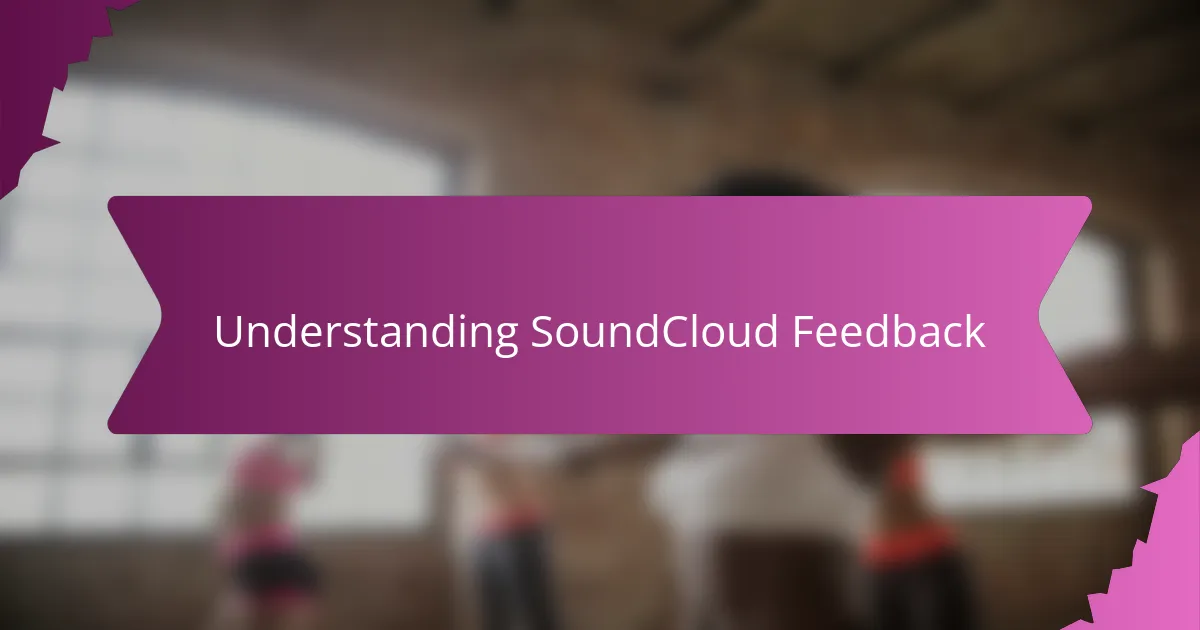
Understanding SoundCloud Feedback
SoundCloud feedback, in my experience, is more than just comments or likes; it’s a window into how listeners truly connect with your music. I remember uploading one of my tracks and waiting anxiously—when the first piece of feedback came, it felt like a conversation rather than a cold critique. Have you ever felt that slight thrill when someone genuinely understands the emotion behind your melody?
What I find fascinating is how feedback on SoundCloud varies so much—from brief cheers to detailed critiques that challenge your creative choices. This variety taught me to appreciate every form, even the tough comments, as they often push me to develop my sound differently. It made me realize that feedback isn’t just about praise; it’s about growth and connection.
Understanding this dynamic helped me navigate the platform with more confidence. Instead of seeing feedback as a simple thumbs-up or down, I started looking for its deeper meaning—what does this listener hear or feel? This shift changed how I approached my music and how I engaged with my SoundCloud community.
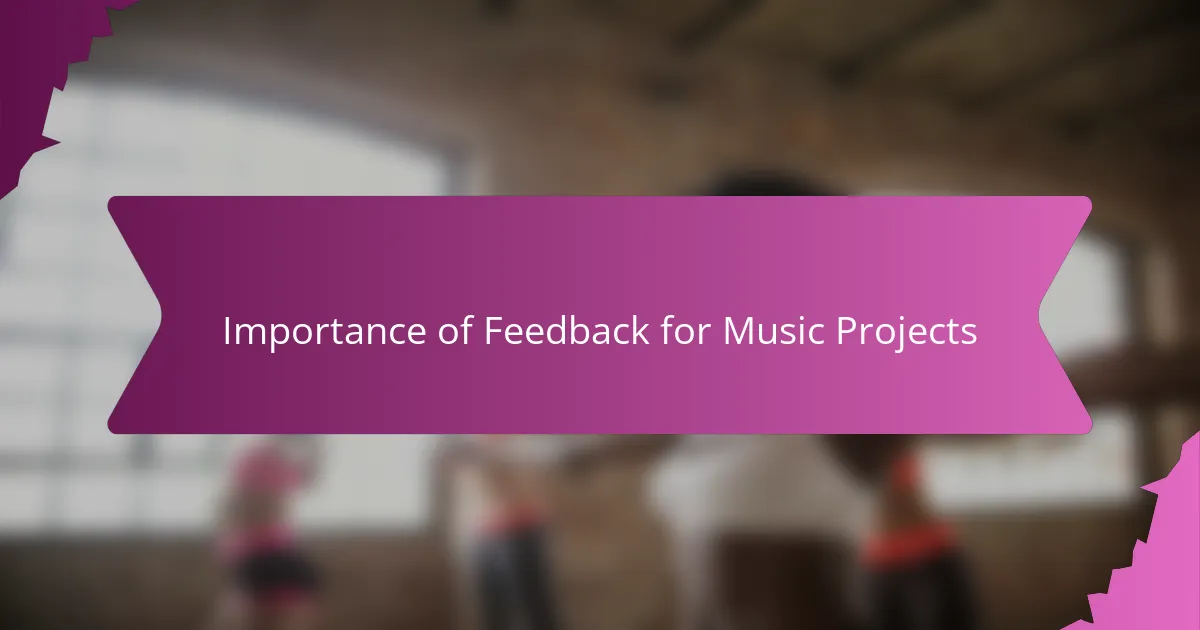
Importance of Feedback for Music Projects
Feedback, in my experience, acts like a compass for music projects. Without it, I often found myself unsure whether my work resonated or missed the mark. Have you ever finished a track and wondered if it truly connected? Feedback helps answer that question and guides you toward refinement.
Sometimes, a single comment can open my eyes to aspects I hadn’t noticed before—maybe the mix feels muddy or the energy could be sharper. These moments taught me that feedback isn’t just about validation; it’s an essential part of learning and evolving as an artist. Without it, progress feels like guesswork.
I also cherish how feedback creates a sense of community around a music project. Knowing that someone took the time to listen and share their thoughts makes the whole creative process feel less lonely. Isn’t music meant to be shared and experienced together? That’s why feedback holds such importance in every step of my musical journey.
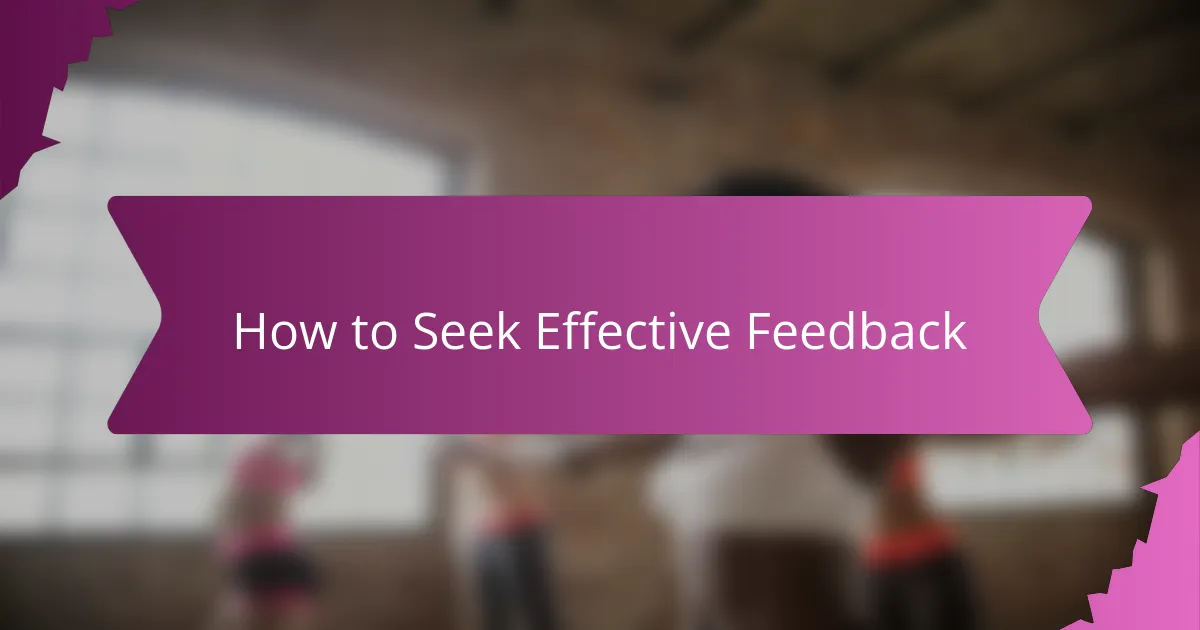
How to Seek Effective Feedback
When I first sought feedback on SoundCloud, I quickly realized that just posting a track and hoping for comments wasn’t enough. I started reaching out directly to listeners who left thoughtful remarks, asking them specific questions about what they heard or felt. Have you ever tried that? It really transformed the feedback from vague impressions into useful, actionable insights.
Another thing I learned is to be clear about the kind of feedback I wanted. Instead of a general “What do you think?”, I’d say, “Could you tell me if the mix balance feels right?” or “Did the beat keep you engaged throughout?” This focus helped me get more precise responses, which I could apply directly to improving my tracks.
Sometimes, though, the best feedback came from being open to unexpected perspectives. I remember one comment pointing out a subtle rhythm issue I hadn’t noticed—and fixing it made the whole track feel more alive. It’s like tuning a conversation to really hear what others are saying, instead of just waiting for approval. How often do we do that in our music projects?
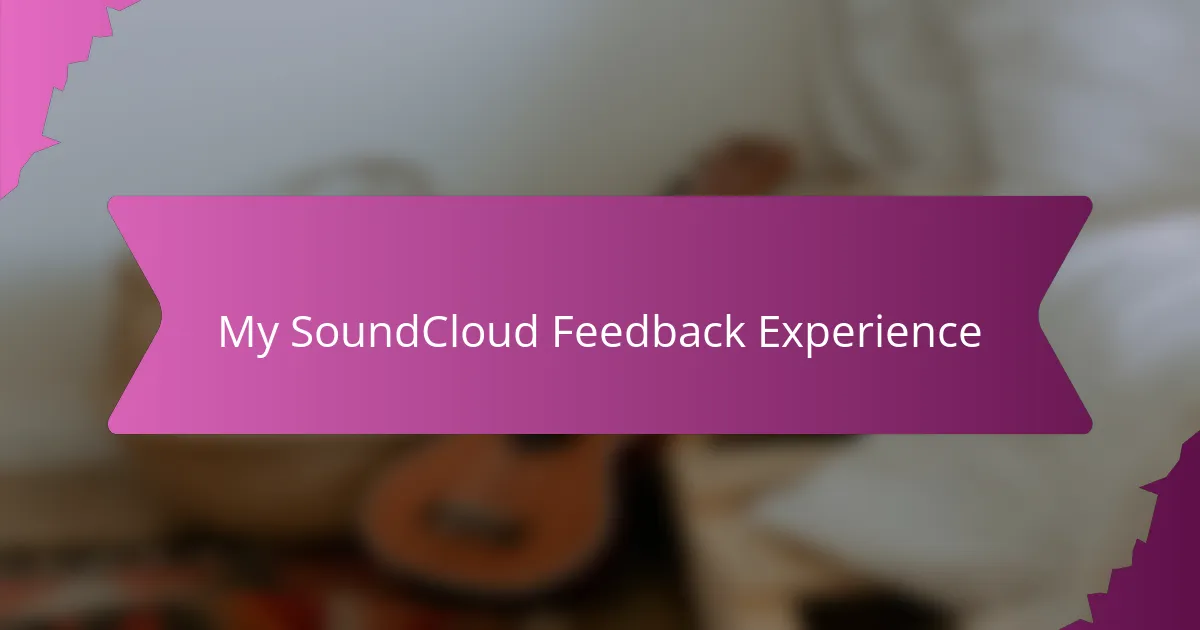
My SoundCloud Feedback Experience
My SoundCloud feedback experience has been a mix of surprises and learning moments. I remember feeling a wave of excitement when a complete stranger took the time to write a detailed comment about the emotion behind one of my tracks. Isn’t it amazing how a few honest words can validate months of hard work?
At times, feedback caught me off guard—like when someone pointed out a tiny flaw I’d missed after listening to my song endlessly. That moment was frustrating but also eye-opening; it made me realize how blind I can be to my own music’s nuances. Have you ever encountered feedback that shifted your whole perspective?
What really struck me about the SoundCloud community is how supportive many listeners are, offering encouragement alongside critique. It feels less like public judgment and more like a collaborative dialogue. Experiencing this has helped me grow not just as a musician, but as someone open to evolving through connection.
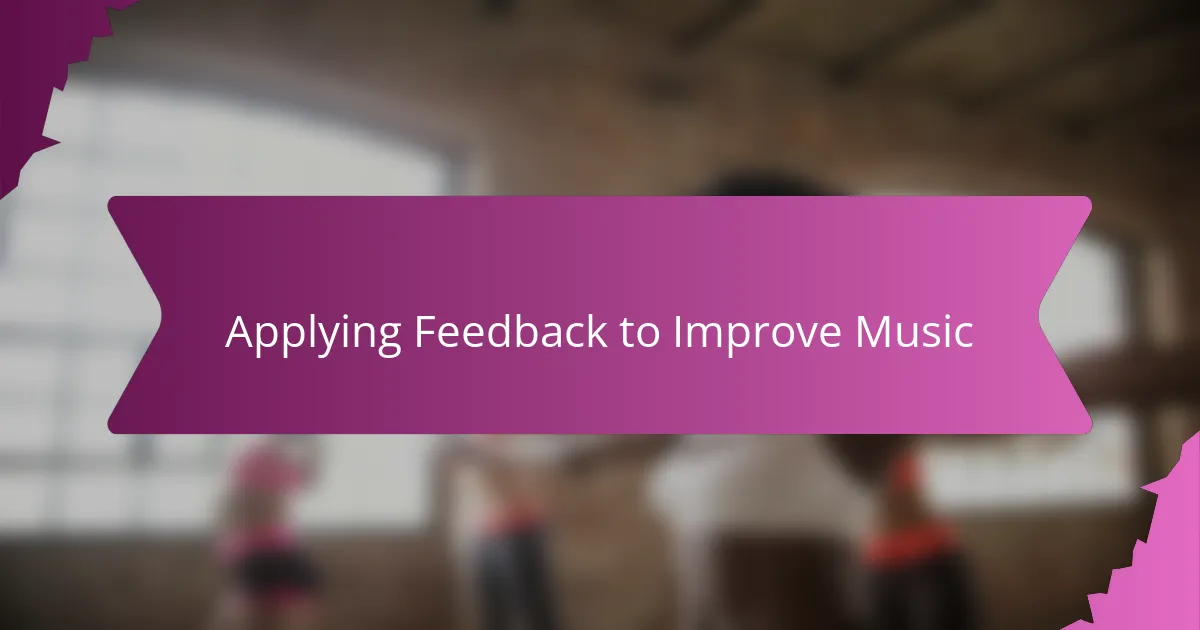
Applying Feedback to Improve Music
Applying feedback to my music often feels like holding up a mirror I didn’t know I needed. I recall one track where a simple comment about the vocals being buried beneath the instruments pushed me to rethink my entire mix. Have you ever reminded how a fresh pair of ears can catch what you repeatedly overlook?
Sometimes, applying feedback isn’t just technical tweaking—it’s about embracing new ideas that challenge my comfort zone. I once hesitated to change the song’s structure based on a suggestion, but taking that risk made the track more dynamic and engaging. It’s amazing how stepping outside your instincts can lead to unexpected improvement.
But I’ve also learned that not every piece of feedback fits perfectly. The key is discerning which comments align with your artistic vision. How do you decide what to incorporate and what to set aside? For me, it’s a blend of trust in my instincts and openness to growth, which makes the process both exciting and deeply personal.
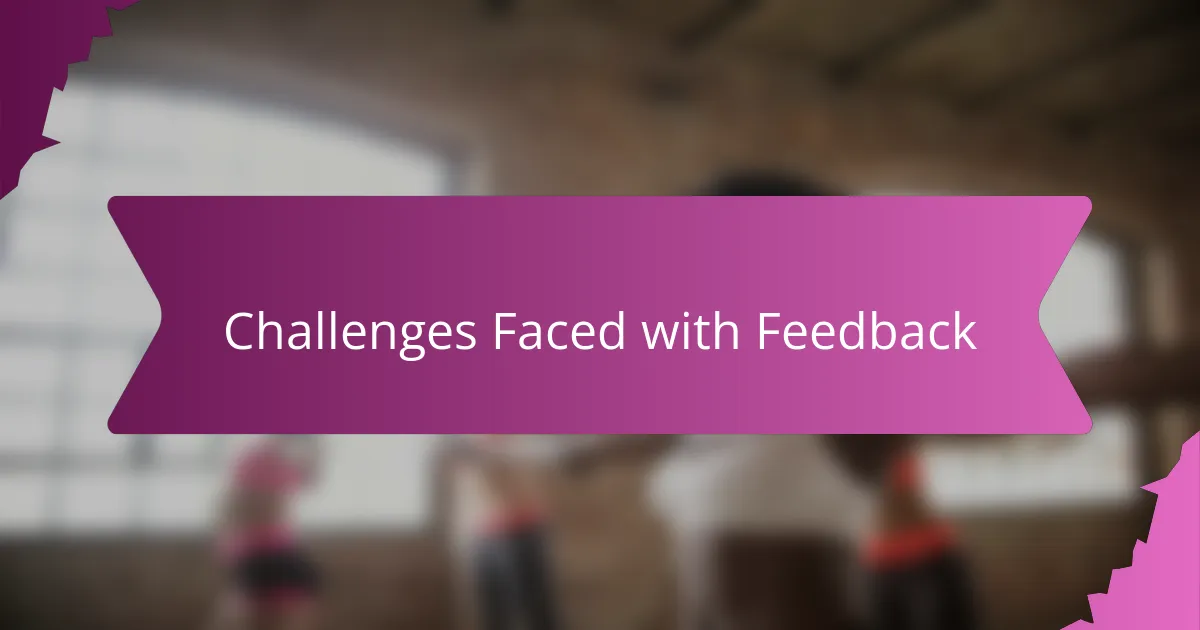
Challenges Faced with Feedback
Getting feedback on SoundCloud isn’t always smooth sailing. I’ve experienced moments where comments were so vague or overly critical that it felt more discouraging than helpful. Have you ever read a comment and thought, “Okay, but what exactly do you mean?”—that ambiguity can be frustrating when you’re eager to improve.
Sometimes, the challenge lies in filtering through conflicting opinions. One listener might praise a section I worked hard on, while another points out its flaws, leaving me torn about which path to take. It’s hard not to feel overwhelmed or second-guess yourself in those moments. How do you decide whose advice deserves your attention?
Another hurdle is dealing with silence—uploading a track and getting little to no response can be discouraging. I recall waiting days for feedback that never came, wondering if my music was simply being ignored. That silence taught me patience but also pushed me to find other ways to connect with listeners beyond just hoping for comments.
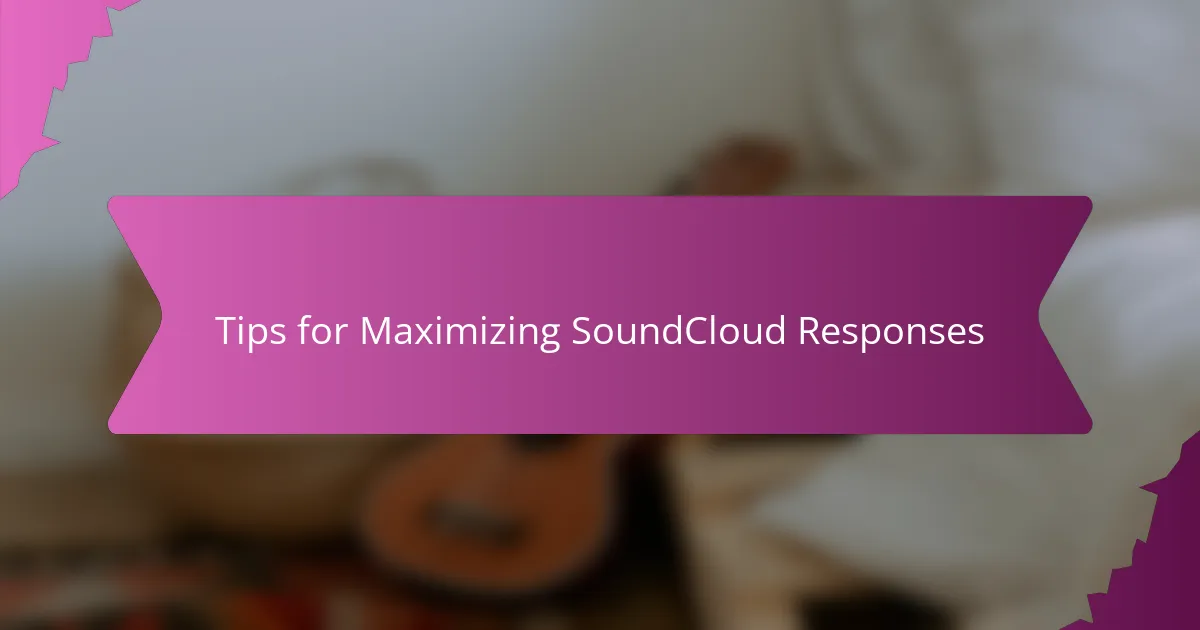
Tips for Maximizing SoundCloud Responses
One thing I found really boosts responses on SoundCloud is being active beyond just posting your tracks. Have you ever noticed how commenting on others’ music often encourages them to return the favor? It feels like building a genuine network rather than just broadcasting into the void.
I also learned that timing matters—posting when your audience is most likely online can make a huge difference. Early on, I experimented with different days and hours until I spotted when my tracks got the most traction. Doesn’t it feel rewarding when your work suddenly gets noticed more eagerly?
Finally, don’t shy away from asking specific questions in your track descriptions or comments. Instead of simply hoping for feedback, try something like, “What do you think about the energy in the chorus?” I’ve seen how this sparks more focused and helpful responses, turning random listeners into engaged collaborators.